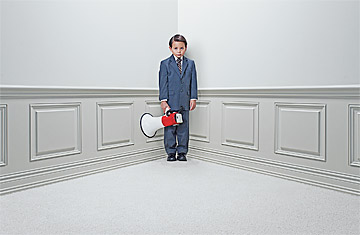
The Power of Shyness
(6 of 7)
In fact, Americans may all be living under an introverted leader right now. Barack Obama isn't shy--no shy person survives a presidential campaign--but he shows tendencies toward introversion, including the love of solitude that helped him thrive as a writer. As a leader, Obama is more facilitator than dominator, and before he was a politician he was an academic--a line of work that probably has more introverts per capita than any other profession except long-haul truckers. As Obama told TIME's Fareed Zakaria recently, he simply prefers to spend his limited free time with his family rather than at Washington parties. "The stereotype that politicians are extroverts has a basis in fact," says Aubrey Immelman, a psychologist who runs the Unit for the Study of Personality in Politics at St. John's University in Minnesota. "But Obama is relatively modest on that scale."
That sets him apart from many of his predecessors, like the gregarious George W. Bush, whose bonhomie was one of his great selling points--to say nothing of Clinton, who had to be physically torn away from crowds. But if extroversion is great on the campaign trail, it doesn't always help in the business of governing. Both Clinton and Bush endangered their presidencies by engaging in what turned out to be graver risks than they might have imagined: one with an intern, the other in Iraq. An introvert like Obama is more inclined to think before he acts, and if anything, the President has been criticized as too risk averse.
Yet Obama's temperament may hold him back in other ways too. He is known to keep a tight circle of advisers, which is a terrible way to become exposed to new ideas or fresh perspectives. The vaunted listening skills of the introvert are pointless, after all, if there's nothing new to hear. The President's rare attempts at schmoozing, like his "golf summit" with House Speaker John Boehner last summer, can seem forced and false. While the who-would-you-want-to-have-a-beer-with test may be an overworked criterion when it comes to choosing among presidential candidates, it does help when that candidate reaches the Oval Office and has to strike bargains with an often obstreperous opposition.
But just because all of us--our Presidents included--have powerful inborn traits doesn't mean we can't stretch the limits of our personalities when the stakes are high enough. Take Brian Little. He's a research psychologist and superstar academic lecturer; his class on personality at Harvard was perennially one of the most popular at the university. He's also a serious introvert, one who needs to take solitary breaks after intense social activity, even--yes--hiding in the bathroom from time to time. "The feeling of stress is always there," says Little.
